10 May 2017 | About Index
[vc_row][vc_column][vc_column_text]
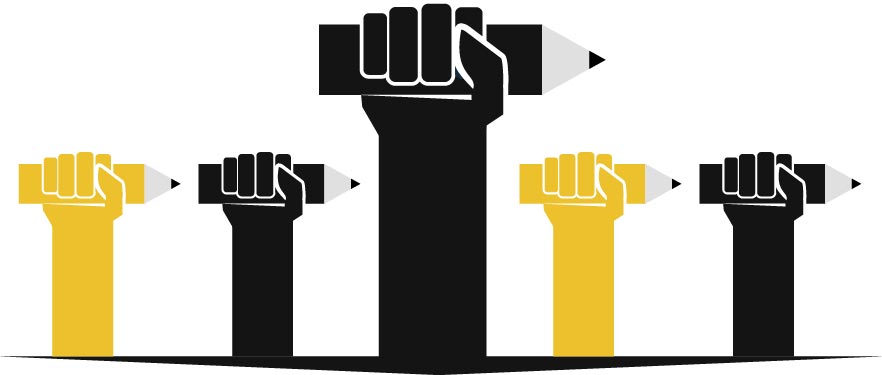
The International Bill of Human Rights, consisting of the five core human rights treaties of the United Nations that function to advance the fundamental freedoms and to protect the basic human rights of all people, was entered into force in 1967 by the UN General Assembly.
The documents contained in the International Bill of Human Rights are: the Universal Declaration of Human Rights; the International Covenant on Economic, Social and Cultural Rights; the International Covenant on Civil and Political Rights; the Optional Protocol to the International Covenant on Civil and Political Rights; and the Second Optional Procotol to the International Covenant on Civil and Political Rights, aiming at the abolition of the death penalty
The full declaration sets out the basic rights all people should enjoy and expect from their governments and other governments. The Universal Declaration of Human Rights and the International Covenant on Civil and Political Rights deal directly with freedom of expression.
Article 19 of the Universal Declaration of Human Rights
Everyone has the right to freedom of opinion and expression; this right includes freedom to hold opinions without interference and to seek, receive and impart information and ideas through any media and regardless of frontiers.
Article 19 of the International Covenant on Civil and Political Rights
1. Everyone shall have the right to hold opinions without interference.
2. Everyone shall have the right to freedom of expression; this right shall include freedom to seek, receive and impart information and ideas of all kinds, regardless of frontiers, either orally, in writing or in print, in the form of art, or through any other media of his choice.
3. The exercise of the rights provided for in paragraph 2 of this article carries with it special duties and responsibilities. It may therefore be subject to certain restrictions, but these shall only be such as are provided by law and are necessary:
(a) For respect of the rights or reputations of others;
(b) For the protection of national security or of public order (ordre public), or of public health or morals.
Article 25 of the International Covenant on Civil and Political Rights
Every citizen shall have the right and the opportunity, without any of the distinctions mentioned in article 2 and without unreasonable restrictions:
(a) To take part in the conduct of public affairs, directly or through freely chosen representatives;
(b) To vote and to be elected at genuine periodic elections which shall be by universal and equal suffrage and shall be held by secret ballot, guaranteeing the free expression of the will of the electors;
c) To have access, on general terms of equality, to public service in his country.
[/vc_column_text][/vc_column][/vc_row][vc_row][vc_column width=”1/2″][vc_column_text]
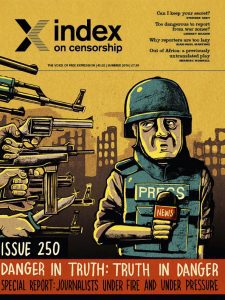
Index on Censorship’s summer magazine 2016
We’ll send you our weekly emails and periodic updates on our events. We won’t share your personal information with anyone outside Index.
You’ll also get access to an exclusive collection of articles from our landmark 250th issue of Index on Censorship magazine exploring journalists under fire and under pressure. Your downloadable PDF will include reports from Lindsey Hilsum, Laura Silvia Battaglia and Hazza Al-Adnan.[/vc_column_text][/vc_column][vc_column width=”1/2″][gravityform id=”20″ title=”false” description=”false” ajax=”false”][/vc_column][/vc_row][vc_row][vc_column][vc_custom_heading text=”More information about freedom of expression”][vc_column_text]Why is free speech important? Freedom of expression is a fundamental human right. It reinforces all other human rights, allowing society to develop and progress. The ability to express our opinion and speak freely is essential to bring about change in society.
Why is access to freedom of expression important? All over the world today, both in developing and developed states, liberal democracies and less free societies, there are groups who struggle to gain full access to freedom of expression for a wide range of reasons including poverty, discrimination and cultural pressures. While attention is often, rightly, focused on the damaging impact discrimination or poverty can have on people’s lives, the impact such problems have on free expression is less rarely addres[/vc_column_text][/vc_column][/vc_row][vc_row][vc_column][vc_basic_grid post_type=”post” max_items=”4″ element_width=”6″ order=”ASC” grid_id=”vc_gid:1494247299440-5e8d8e06-86b1-1″ taxonomies=”9210″][/vc_column][/vc_row]
8 May 2017 | About Index
[vc_row][vc_column][vc_column_text]
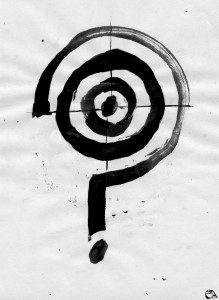
A drawing by French cartoonist t0ad
Adopted and proclaimed on 10 December 1948 by the General Assembly of the United Nations, the Universal Declaration of Human Rights contains 30 articles that have been embedded in international treaties, national constitutions and other laws. The declaration is one of the cornerstones of the International Bill of Human Rights, which became law in 1976.
The full declaration sets out the basic rights all people should enjoy and expect from their governments and other governments. Though the declaration is often ignored, it represents the ideal that the world’s government should strive to meet.
Article 18 and Article 19 deal with freedom of thought and freedom of expression most directly, though other articles also reference these fundamental rights.
Article 18 of the Universal Declaration of Human Rights
Everyone has the right to freedom of thought, conscience and religion; this right includes freedom to change his religion or belief, and freedom, either alone or in community with others and in public or private, to manifest his religion or belief in teaching, practice, worship and observance.
Article 19 of the Universal Declaration of Human Rights
Everyone has the right to freedom of opinion and expression; this right includes freedom to hold opinions without interference and to seek, receive and impart information and ideas through any media and regardless of frontiers.[/vc_column_text][/vc_column][/vc_row][vc_row][vc_column][vc_custom_heading text=”Subscribe to the Index newsletters” font_container=”tag:h3|text_align:left” use_theme_fonts=”yes”][vc_separator color=”black”][/vc_column][/vc_row][vc_row][vc_column width=”1/2″][vc_column_text]
Index on Censorship is a nonprofit that defends people’s freedom to express themselves without fear of harm or persecution. We fight censorship around the world.
To find out more about Index on Censorship and our work protecting free expression, join our mailing list to receive our weekly newsletter, monthly events email and periodic updates about our projects and campaigns. See a sample of what you can expect here.
Index on Censorship will not share, sell or transfer your personal information with third parties. You may may unsubscribe at any time. To learn more about how we process your personal information, read our privacy policy.
You will receive an email asking you to confirm your subscription to the weekly newsletter, monthly events roundup and periodic updates about our projects and campaigns.
[/vc_column_text][/vc_column][vc_column width=”1/2″][gravityform id=”20″ title=”false” description=”false” ajax=”false”][/vc_column][/vc_row][vc_row][vc_column][vc_separator color=”black”][/vc_column][/vc_row][vc_row][vc_column][vc_custom_heading text=”More information about freedom of expression” font_container=”tag:h2|font_size:26|text_align:left” use_theme_fonts=”yes”][vc_column_text]Why is free speech important? Freedom of expression is a fundamental human right. It reinforces all other human rights, allowing society to develop and progress. The ability to express our opinion and speak freely is essential to bring about change in society.
Why is access to freedom of expression important? All over the world today, both in developing and developed states, liberal democracies and less free societies, there are groups who struggle to gain full access to freedom of expression for a wide range of reasons including poverty, discrimination and cultural pressures. While attention is often, rightly, focused on the damaging impact discrimination or poverty can have on people’s lives, the impact such problems have on free expression is less rarely addressed.[/vc_column_text][/vc_column][/vc_row]
21 Sep 2016 | Magazine, mobile, News, Volume 45.02 Summer 2016 Extras, Youth Board
In the latest issue of Index on Censorship magazine, The Unnamed: Does anonymity need to be defended?, Index’s contributing editor for Turkey, Kaya Genç, explores anonymous artists in Turkey. In the piece the artists discuss how vital anonymity is in allowing them to complete their more controversial work. The Index on Censorship youth advisory board have taken inspiration from this piece for their latest task, in which they investigate anonymous art around the world.
Keizer by Constantin Eckner
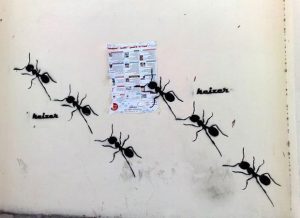
Ants feature in Keizer’s work to sybolise “the forgotten ones, the silenced, the nameless, those marginalised by capitalism”. Image: Keizer
Prior to the January 25 Revolution political street art was anything but common in Egypt, yet it has proliferated in public spaces in the aftermath of the revolution. One of the most productive street artists in Cairo is Keizer, who has gained popularity and notoriety in recent years. Like Banksy and other street artists, he uses the well-known stencil technique to empower his fellow countrymen, and people in general, with his thought-provoking work. He likens people to ants, which are featured in most of his graffiti. Keizer explains on his Facebook account that the ant “symbolises the forgotten ones, the silenced, the nameless, those marginalised by capitalism. They are the working class, the common people, the colony that struggles and sacrifices blindly for the queen ant and her monarchy.”
Asked about the reason for protecting his identity, Keizer said: “I am very concerned over my safety and the repercussions of street art which I’ve already had a taste of, especially with this current regime. Including death threats,
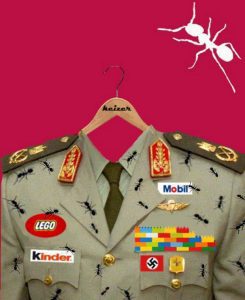
Egyptian street artist Keizer has gained popularity in recent years. Image: Keizer
my twitter account was hacked twice. In the past five years of working on the street I’ve been caught once. I came out of it with a few bumps and bruises, nothing major. I consider myself lucky that I came out one day later.
“You can imagine that being caught here is very different than being caught in Europe. There is no proper procedure and that makes you a victim of the person handling you, and the uncertainty of what comes next. Graffiti is a grey area here, they don’t have any definition or classification for it in the books, so they make it up as they go along, taking you for the fear ride. It’s all under vandalism, so they can make it look small or escalate it to exaggerated levels. For instance, you can be dubbed as a political traitor; it can be considered racketeering; they can glue your name to any political movement unpopular with the people…etc.”
Tall walls, low profiles: Icy and Sot by Layli Foroudi
Icy and Sot describe themselves as stencil artists from Tabriz, Iran. As for their identities, they reveal only that they are brothers, born in 1985 and 1991. Their work is created under pseudonyms in countries around the world, including Iran, USA, Germany, Norway, and China, on legal and illegal walls as well as in galleries.
The anonymous duo, who paint on themes like human rights, censorship, and justice, say that charges against artists in Iran make going public risky.
“Pseudonyms help us to keep a low profile,” the brothers explained in an interview with ArtInfo, “Being arrested in Iran is completely different, because they charge you with crimes that you have not even committed, like Satanism or political crimes.”
Their work often uses striking human faces in black and white to make statements about politics and the environment, to call for peace, and to direct messages at the government of Iran. In 2015, Icy and Sot used their art to protest for freedom of expression in Iran, prompted by the arrest and 18-month imprisonment of Atena Farghadani, an Iranian artist who was detained for publishing a cartoon that satirised the Iranian government as animals. In solidarity, they stenciled a tribute piece depicting Farghadani with a backdrop of protesters on a wall in Brooklyn.
Maeztro Urbano’s fight to change a criminal image by Ian Morse.
In the most recent data, Honduras has the highest homicide rate in the world, with 84 intentional homicides per 100,000 people in 2013. The prominence of drug trafficking and ubiquity of poverty does not improve its reputation.
To some Hondurans, their country’s international image has done nothing but hurt citizen’s attempts to improve daily life in the country’s bustling cities and lively cultural centers. Maeztro Urbano and his friends became the face of an urban street art project to disrupt the atmosphere of crime and reveal another side of the country outside of the headlines.
His projects range from adjusting street signs promoting gender equality to vandalising billboards with corrupt politicians, to wall graffiti showing the effect of violence on children. Working his day shifts in the advertising industry, Maeztro Urbano said he wants to contribute more to his country than proliferating consumerism.
“Change should start within society. With each individual,” El Maestro – as he is also called – told The Creators Project. “To have respect for the lives of others, to respect the right to sexual diversity, to a better education.”
“If we don’t change that as a society and as individuals, we will never be able to change as a country.”
Assailants in Honduras have not been very hospitable to those reporting on crime or those wishing to express their identity. Faced with police harassment and shootings from unknown attackers, Maeztro Urbano chooses to wear a mask while he works to spread messages of hope around the country.
Bleeps.gr: Over a decade of political artivism in Athens by Anna Gumbau.
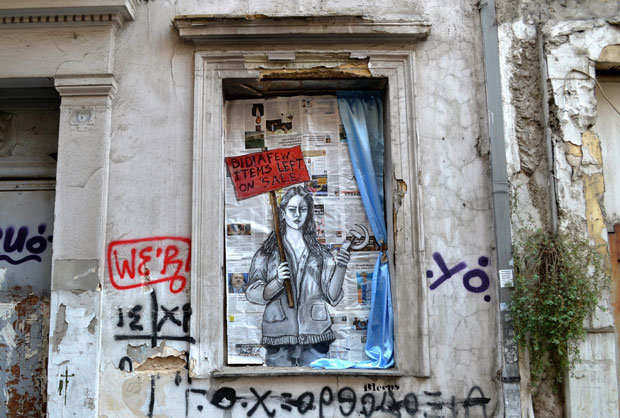
Bleeps.gr is one of Greece’s most prominent street artists, having painted murals on the streets of Athens for over 10 years. Image: Bleeps.gr
“I have been radically oriented to the political discourse, utilising the public sphere, and I am not afraid or discouraged”, Bleeps.gr, one of the most prominent Greek street artists, told Index.
Bleep.gr has been designing murals, that are mostly critical of the austerity policies imposed to Greece, on the streets of Athens for over 10 years. The Greek social turmoil has had a strong influence on his artwork, not only in his scenes, but even in his methods. “I buy very cheap materials and can’t afford those impressive equipment to create a mural”, he said in an interview with Street Art Europe.
Bleeps.gr chooses to use a pseudonym as an attempt to challenge “the institutionalised perception of the identity”, he told Index. While he is not afraid of the state authorities, he points at art institutions, such as galleries, exhibitions and festivals, who reject and exclude his art. “Most of the censorship I have received has come from other artists, especially the ones related to systemic initiatives, who in the past years have removed all of my works from the city center” he said. Greek political street artists often suffer from the exclusion of art galleries and exhibitors; in the summer of 2013, the CRISIS? WHAT CRISIS? street art festival in Athens, which celebrates the value of street art in the current political happenings, invited 20 artists from different European countries but failed to invite any Greek artists.
Nevertheless, Bleeps.gr stresses the fact that the internet “has provided a virtual field of allocation”, and most of the political street art discourse happens there.
Bleeps.gr highlights the mechanisms of such institutions to “absorb street artists” and make them become part of the art “business”, adding: “the majority of them nowadays serve gentrification policies and turn policies and turn political art into a spectacle for tourist pleasure”.
King of Spades by Sophia Smith-Galer.
When it comes to anonymous artists, the art tends to speak far louder than any speculation into the artist themselves. This anonymous artist in Lebanon is no Arab Banksy that lurks tantalisingly close to the limelight; this artist could quite literally be anyone, and the lack of anybody claiming the piece as their own is revelatory of the grave reality of artists in developing countries that test the patience of despots and tyrants.
Despite its tired and no longer relevant label “Paris of the Middle East”, even the dazzlingly artistic city of Beirut, Lebanon, can’t quite get away with hanging something like this banner, depicting the late Saudi Arabian monarch King Abdullah bin Abdul Aziz as a brutal King of Spades. Shortly after its creation in 2013, the Lebanese state prosecutor ordered an investigation to reveal the source of these posters after complaints from Saudi Ambassador Ali Awad Asiri.
It seems that nobody got caught, and nor do I particularly want to dwell on what would have happened to the artist if they had. But in the Middle East, such a daring artistic expression must be forbidden fruit in a region of gagged political artistry; demonstrated no better than in this mysterious artist who gambled with the assumed impunity of that gentleman with the bloodied scimitar.
Dede Bandaid by Shruti Venkatraman.
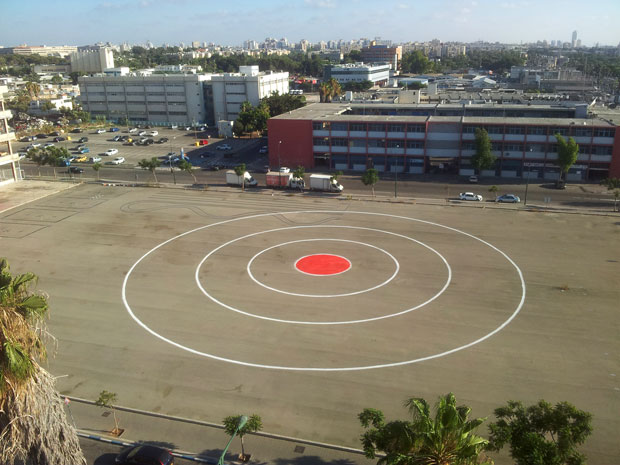
One of Dede Bandaid’s most well known works, a missile target painted in the middle of a large car park, a reference to the Gaza conflict in 2014. Image: Dede Bandaid / Wikicommons
Dede Bandaid is an anonymous Israeli artist who has added colour to Tel Aviv’s streets with thought provoking and politically relevant street art. His artistic career began in 2000 during his compulsory military service, and most of his earlier pieces demonstrated a clear anti-establishment sentiment. His more recent works, following the end of his stint in the military, aim to communicate social and political messages. One of his most well known works is a missile target painted in the middle of a large car park, a reference to the Gaza conflict in 2014.
Dede enjoys using public spaces as a canvas as this approach allows freer and more controversial expression, while also being accessible to and viewable by a larger audience especially when the street art is photographed and its images are circulated online. He also makes use of traditional symbols of peace, like the white dove, and frequently incorporates Band-Aids that represent healing and remedy in his artwork, with “Bandaid” being the pseudonym he signs on all his pieces. Over time, Dede’s style has evolved from stencilling to free-hand painting and collage and he interestingly also exhibits certain pieces in galleries across the world.
Cabbage Walker in Kashmir by Niharika Pandit.
A pheran-clad man walks around with a cabbage on a leash in the neighbourhoods of Srinagar, Kashmir. This performance act that he presents is inspired by Chinese artist Han Bing’s “Walking the Cabbage” social intervention work. While Bing chose to walk the cabbage to reflect on the changing values in the Chinese society, where once cabbage was a subsistence food product but is now only embraced by the poor, in Kashmir, this anonymous artist aims to normalise the cabbage walking to show the absurdity of militarisation in the region. Both the performances employ cabbage as an element of satire to expose the irony inherent in what how elitism and militarisation come to be normalised in societies across the world.
The Kashmiri Cabbage Walker writes on his blog, “I as a Kashmiri am willing to recognise walking the cabbage as part of the Kashmiri landscape but I will never accept the check posts, the bunkers, the army camps, the torture centers, the barbed wire, the curfews, the arrests, the toxic environment of conflict and war, as part of the same.”
This performance artist chooses to remain anonymous as it helps in focusing on the message and not the messenger. The Kashmiri Cabbage Walker says that he represents all Kashmiri lives under militarisation thereby revealing the artist’s identity becomes unimportant here.
Cracked pavements in Budapest by Fruzsina Katona.
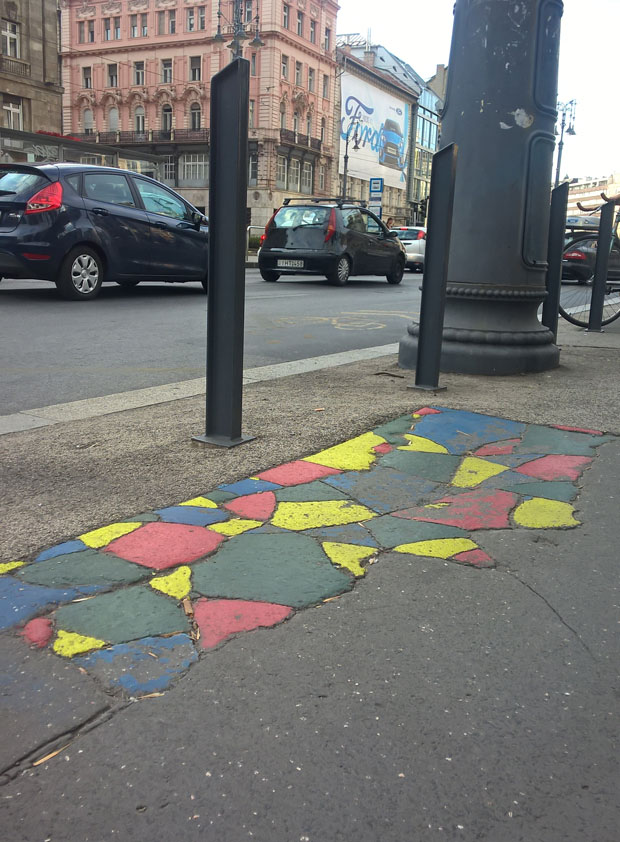
Anonymous volunteers have joined the satirial political party the Two-Tailed Dog party (MKKP) to paint cracked pavement on the streets of Budapest. Image: Fruzsina Katona
Anonymity does not necessarily mean that one is trying to hide his or her identity. Sometimes the identity of the person is utterly irrelevant. In Budapest, several anonymous volunteers are painting the streets of the city.
The pavement on the streets of the Hungarian capital are falling apart, ruining the image of the city and endangering those who walk on it. Authorities are known to do very little to fix the problem, but something had to be done. Hungary’s satiric political party, the Two-Tailed Dog party (MKKP) called for action and its artsy, anonymous volunteers started colouring the cracked pavement pieces resulting in dozens of cheerful spots across the city.
Unfortunately, there are some who find quarrels in a straw, and the police were called on the ad-hoc artists while they were peacefully decorating the pavement in a touristic neighbourhood. Now the volunteers are being prosecuted with vandalism.
But we still do not know their identity or how many of them are out decorating. All we know is that now we look at colourful patches of pavements while running our errands, instead of the sad and ugly cracked pavements.
8 Aug 2016 | mobile, News, Youth Board
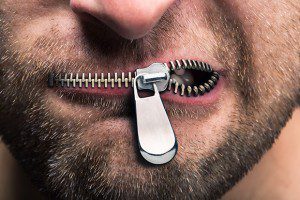
(Photo illustration: Shutterstock)
For the past six months the Index on Censorship Youth Advisory Board has attended monthly online meetings to discuss and debate free speech issues. For their final assignment we asked members to write about the issue they felt passionately about that took place during their time on the board.
Simon Engelkes – Terrorism and the media in Turkey
When three suicide bombers opened fire before blowing themselves up at Istanbul Atatürk airport on 28 June 2016, Turkey’s social media went quiet. While the attacks were raging in the capital’s airport, the government of president Recep Tayyip Erdogan blocked social networks Facebook and Twitter and ordered local media not to report the details of the incident – in which at least 40 people were killed and more than 200 injured – for “security reasons”.
An order by the Turkish prime minister’s office banned sharing visuals of the attacks and any information on the suspects. An Istanbul court later extended the ban to “any written and visual media, digital media outlets, or social media”. Şamil Tayyar, a leading deputy of the ruling Justice and Development Party said: “I wish those who criticise the news ban would die in a similar blast.”
Hurriyet newspaper counted over 150 gag orders by the government between 2010 and 2014. And in March 2015, Turkey’s Constitutional Court approved a law allowing the country’s regulator to ban content to secure the “protection of national security and public order” without a prior court order. Media blackouts are a common government tactic in Turkey, with broadcast bans also put in place after the bombings in Ankara, Istanbul and Suruç.
Emily Wright – The politics of paper and indirect censorship in Venezuela
Soaring inflation, high crime rates, supply shortages and political upheaval all typically make front-page news. Not so in Venezuela, where many newspapers have suspended printing because of a shortage of newsprint.
For over a year now, the socialist government of Nicolás Maduro has centralised all paper imports through the Corporación Maneiro, now in charge of the distribution of newsprint. It is a move the political opposition is calling a form of media censorship, given that many newspapers critical of Chavismo and Maduro’s regime, have been struggling to obtain paper to print news.
In January, 86 newspapers declared a state of emergency, announcing they were out of stock and their capacity to print news was at risk. El Carabobeño, which is critical of the government and Chavismo, stopped circulating in March due to a lack of paper. A year earlier the newspaper had been forced to change its format to a tabloid, and reduce its pages, after running as a standard newspaper since 1933.
Censorship is an long-term problem in Venezuela but it is taking new, covert forms under Hugo Chávez’s successor, Nicolás Maduro. Media outlets are being economically strangled through tight regulation. On top of this huge fines for spurious charges of defamation or indecency linked to articles have become commonplace. Correo del Coroni, the most important newspaper in the south of the country, went bankrupt in this fashion. In March it was fined a million dollars and its director sentenced to four years in jail for defamation against a Venezuelan businessman. A month earlier it was forced to print only at weekends after being systematically denied newsprint.
Under Maduro’s regime, censorship in Venezuela has gone from piecemeal to systemic and the public’s right to information has been lost in the mix. Unable to mask the country’s hard realities with populist promises like his predecessor did, Maduro has been cracking down on the media instead.
Reporters Without Borders recently rated the press in Venezuela as being among the least free in the world, ranking it 139 out of 180 countries, below Afghanistan and Zimbabwe. Freedom House recently rated the press in Venezuela as Not free.
Mark Crawford – The UK government’s anti-BDS policy
In February this year, the British government banned public boycotts of Israeli goods. In recent years, the Boycott, Divestment and Sanctions campaign has become popular among those in opposition to the oppression of the Palestinian people, whereby Israeli goods, services and individuals are evaded or censored.
It’s illogical to punish an entire nation, as BDS does, for the actions of those in power. The answer to this illiberal policy must not be, however, to hand greater power to faceless, bureaucratic law enforcement to suppress freedom of expression.
As a result of the government’s clampdown, the board of trustees at my students’ union, UCLU, has already overridden a pro-BDS position democratically endorsed – however poorly – by its Union Council; but as well as emboldening the very illiberal voices that thrive on the aloof vilification of bureaucrats, the board even elected to censor council’s harmless and necessary expressions of solidarity with the Palestinian people.
The cure for faulty ideas and tactics is better ideas and better politics – translated through debate and honest self-reflection. Not only have legal shortcuts never worked, but they’re ideologically hypocritical and politically suicidal.
Ian Morse – Twitter’s safety council
Twitter unveiled its safety council in February. Its purpose is to ensure that people can continue to “express themselves freely and safely” on Twitter, yet there are no free speech organisations included.
So while the group ostensibly wants to create safety, its manifesto and practice suggest otherwise. The group doesn’t stop incitements of violence, it stops offensive speech. Safety only refers to the same attempts to create “safe spaces” that have appeared in so many other places. There is a difference between stopping the promotion of violence within a group – as Twitter did with 125,000 terrorism-related accounts – and stopping people from hearing other people’s views. Twitter has a mute and block button, but has also resorted to “shadow banning”.
Now compound this with the contradiction that is Twitter’s submission to authoritarian governments’ demands to take down content and accounts in places where not even newspapers can be a forum for free information, such as Russia and Turkey.
It’s indicative of two wider trends: the consolidation of “speech management” in Silicon Valley, and the calamitous division of the liberal left into those who allow the other side to speak and those who do not.
Layli Foroudi – Denied the freedom to connect: censorship online in Russia
The United Nations Human Rights Commission has brought the human rights framework into the digital age with the passing of a resolution for the “promotion, protection, and enjoyment of human rights on the internet”, particularly freedom of expression.
Russia opposed the resolution. This is unsurprising as the government institutionalises censorship in legislation, using extremism, morality and state security as justifications. Since November 2012, the media regulatory body Roskomnadzor has maintained an internet blacklist. Over 30,000 online resources were listed in April, plus 600,000 websites that are inaccessible due to being located on the same IP address as sites with “illegal” information.
This year, the internet in Russia has experienced increased censorship and site filtering under the influence of Konstantin Malofeev whose censorship lobbying group, the Safe Internet League, has been pushing for stricter standards in the name of Christian Orthodox morality, freedom from extremism and American influence.
Activists in Russia have claimed that their messages, sent using encrypted chat service Telegram, have been hacked by Russian security forces. Surveillance was what originally drove Pavel Durov, founder of Telegram and social network VKontakte, to set up the encrypted service as he and his colleagues felt the need to correspond without the Russian security services “breathing down their necks”. Durov himself lives in the US, a move prompted by the forced sale of VKontakte to companies closely aligned with the Kremlin, after the social network reportedly facilitated the 2011 protests against the rigging of parliamentary elections. His departure confirms theories about the chilling effect that crackdowns on expression can have on innovation and technology in a country.
In June a new law was passed which requires news aggregators, surpassing one million users daily, to check the “truthfulness” of information shared. Ekaterina Fadeeva, a spokesperson for Yandex, the biggest search engine in Russia, said that Yandex News would not be able to exist under such conditions.
Madeleine Stone – The murder of Joe Cox
The brutal daylight murder of Yorkshire MP Jo Cox may not initially seem like a freedom of speech issue.
Approached outside her constituency surgery on 16 June 16, at the height of the polarising Brexit debate, Cox was stabbed to death by a man who shouted “Put Britain first” as he attacked her. Cox was an ardent supporter of Britain remaining a member of the European Union, flying a “Stronger In” flag as she sailed down the Thames with her family in a dingy the day before her murder. Her passionate campaigning over the referendum should not have been life threatening.
In Britain, we imagine political assassinations to take place in more volatile nations. We are often complacent that our right to free speech in the UK is guaranteed. But whilst there are people intimidating, attacking and murdering others for expressing, campaigning on and fighting for their beliefs, this right is not safe. For democracy to work, people need to believe that they are free to fight for what they believe is right, no matter where they fall on the political spectrum. Jo Cox’s murder, which for the most part has been forgotten by British media, should be a wake-up call to Britain that our freedom of speech cannot be taken for granted.









